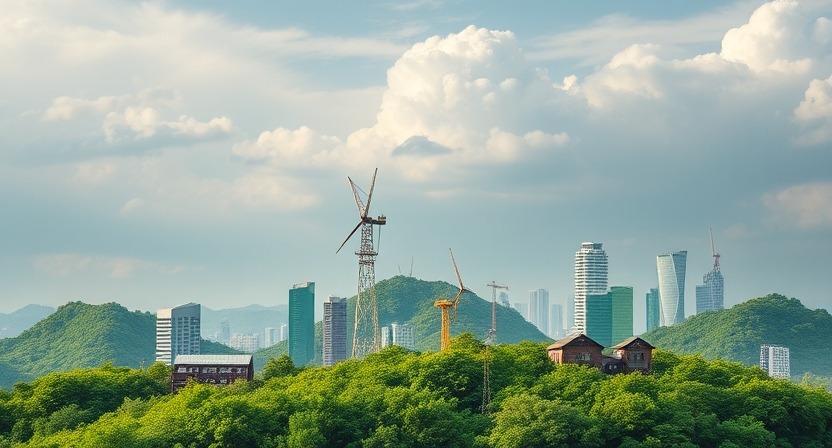In recent years, the term “green economy” has become more than just a buzzword. It represents a global shift towards sustainability—an economy that prioritizes environmental health, social well-being, and economic growth in harmony. Businesses around the world are recognizing the immense potential of sustainability to drive innovation and create new opportunities.
Let’s explore how the green economy is reshaping industries and fueling creative solutions for a better future.
What is the Green Economy?
The green economy refers to an economic system that prioritizes sustainable practices. It aims to reduce carbon emissions, minimize waste, and preserve natural resources while fostering economic growth. This approach moves away from traditional practices that often harm the environment and emphasizes creating value in ways that benefit both people and the planet.
Key Pillars of the Green Economy
- Reducing Carbon Footprints: Shifting to renewable energy sources and eco-friendly production methods.
- Circular Economy Practices: Recycling and reusing materials to minimize waste.
- Social Inclusivity: Supporting fair wages, safe working conditions, and community well-being.
These principles are reshaping how businesses operate and inspiring innovation across industries.
Why Sustainability is the New Competitive Edge
Sustainability is no longer optional; it’s a business imperative. Consumers are increasingly prioritizing eco-friendly choices, seeking products and services that reflect their environmental values.
Consumer Demand for Green Products
Research reveals that more than 60% of consumers worldwide are willing to spend extra on sustainable products. Businesses that adapt to this demand can gain a competitive edge, foster loyalty, and expand their market reach.
Cost Savings Through Efficiency
Sustainability initiatives often lead to significant cost savings. For example, switching to renewable energy or adopting energy-efficient processes can reduce operational expenses.
Attracting Investment
Green businesses are attracting investors who prioritize environmental, social, and governance (ESG) criteria. Companies demonstrating commitment to sustainability are better positioned to secure funding.
How the Green Economy Drives Innovation
Innovation thrives in the face of challenges, and the need for sustainability has sparked groundbreaking ideas across sectors.
1. Renewable Energy Solutions
The energy industry is a prime example of green innovation. Solar panels, wind turbines, and advanced battery storage technologies are making clean energy more accessible and affordable. Businesses like Tesla have revolutionized the energy and automotive industries by integrating renewable solutions.
2. Green Building Materials
The construction industry is embracing sustainability through materials like bamboo, recycled steel, and self-healing concrete. These innovations reduce the environmental impact of buildings while enhancing durability and efficiency.
3. Sustainable Packaging
Single-use plastics are being replaced with biodegradable and compostable alternatives. Companies like Tetra Pak and Loop are creating reusable packaging systems that reduce waste and promote circular economy practices.
4. Eco-Friendly Transportation
Electric vehicles (EVs) are transforming transportation. Companies like Rivian and BYD are pushing the boundaries with affordable, long-range EVs. Shared mobility platforms and bike-sharing systems also contribute to greener cities.
Real-World Examples of Green Business Innovation
Patagonia: Leading by Example
Outdoor clothing brand Patagonia has integrated sustainability into every aspect of its business. From using recycled materials in products to encouraging customers to repair instead of replacing, Patagonia sets a high bar for green practices.
Unilever’s Sustainable Living Plan
Global giant Unilever has committed to reducing its environmental footprint while increasing its positive social impact. Its Sustainable Living Plan focuses on reducing waste, promoting healthy living, and sourcing raw materials responsibly.
Tesla: Driving Change
Tesla is more than a car company; it’s an innovation powerhouse. Its electric vehicles, solar panels, and energy storage systems are revolutionizing how we think about energy and transportation.
Challenges of Transitioning to a Green Economy
While the green economy offers immense opportunities, the transition isn’t without challenges.
High Initial Costs
Adopting sustainable practices often requires significant upfront investment. Yet, the long-term gains frequently surpass the initial costs.
Regulatory Hurdles
Different regions have varying environmental regulations, creating complexities for businesses operating globally.
Consumer Education
Not all consumers are aware of the benefits of sustainable products. Companies must invest in educating their audience to drive adoption.
What Lies Ahead for the Green Economy
The green economy is not a trend; it’s the foundation of a sustainable future. As more businesses embrace this approach, we can expect a wave of innovation that transforms industries and improves lives.
The Role of Technology
Emerging technologies like artificial intelligence, blockchain, and the Internet of Things (IoT) are key enablers of sustainability. For instance:
- AI can optimize energy consumption and reduce waste.
- Blockchain ensures transparency in supply chains.
- IoT enables smarter, more efficient resource management.
Collaborative Efforts
The transition to a green economy requires collaboration among governments, businesses, and individuals. Public-private partnerships and international agreements like the Paris Accord are crucial to achieving global sustainability goals.
How You Can Support the Green Economy
- Choose Green Products: Support businesses that prioritize sustainability.
- Reduce Waste: Embrace recycling and minimize single-use items.
- Advocate for Change: Encourage your community and policymakers to prioritize green initiatives.
Conclusion
The green economy is more than an environmental initiative—it’s a movement that integrates sustainability into the core of economic activity. By driving innovation, fostering economic growth, and addressing environmental challenges, it’s paving the way for a brighter, greener future.
Businesses that invest in sustainability today are not only securing their position in tomorrow’s market but are also contributing to a healthier planet for generations to come.







